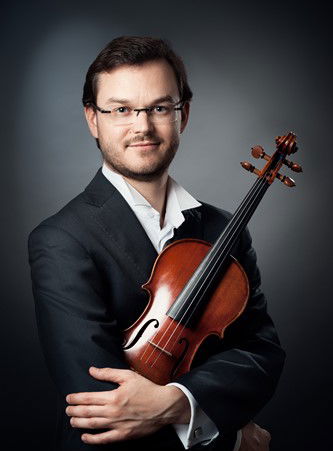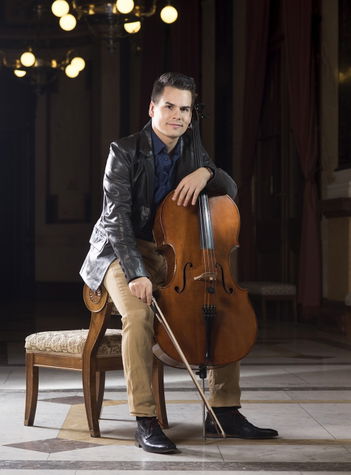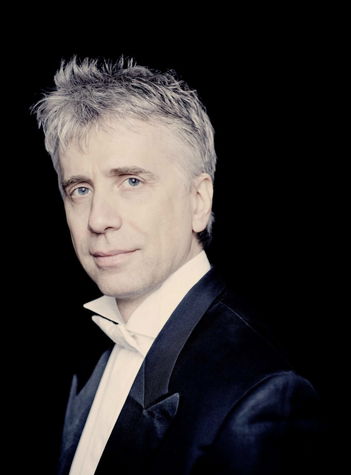Programme
Ludwig van Beethoven
Triple Concerto for violin, cello, piano, and orchestra in C major, Op. 56
Antonio Vivaldi
Concerto No. 3 in D major “Il Cardellino”, Op. 10
Joseph Haydn
Symphony No. 54 in G major, Hob I:54
Secure your seat for the 2025/2026 season – presales are open.
Choose SubscriptionGiovanni Antonini, a specialist in the interpretation of the music of the Baroque and early Classical eras, has returned to the Czech Philharmonic repeatedly. We will hear him as a soloist in a Vivaldi flute concerto that evokes birdsong. Besides Beethoven’s Triple Concerto, he will also conduct the 54th of Joseph Haydn’s 107 symphonies, which he is now recording in their entirety.
Subscription series B
Ludwig van Beethoven
Triple Concerto for violin, cello, piano, and orchestra in C major, Op. 56
Antonio Vivaldi
Concerto No. 3 in D major “Il Cardellino”, Op. 10
Joseph Haydn
Symphony No. 54 in G major, Hob I:54
Jan Fišer violin
Václav Petr cello
Karolina Pancernaite piano
Giovanni Antonini recorder, conductor
Czech Philharmonic

As a boy, Giovanni’s parents wanted to enrol him in the preparatory department of the Milan Conservatoire. According to the school, their son was too high-spirited, and he was not admitted as a violin student, but he soon more than made up for their disappointment. He studied the recorder, and while still a student, he joined with the lute player Luca Pianca in establishing Il Giardino Armonico—an ensemble that has won worldwide renown over its 40 years of existence in the field of the informed interpretation of early music.
Since 2014, Antonini and the ensemble have been working on the project Haydn 2032, presented by the Joseph Haydn Foundation in Basel. The goal is to record all 107 of the composer’s symphonies by his 200th birthday, for the first time on period instruments and on the basis of the latest research on how his works were originally interpreted.
However, Antonini’s knowledge does not hinder his unorthodox approach to music: “We can benefit from the fact that there no longer exists a ‘traditional’ or ‘modern’ orchestral sound or a single period instrument sound because there are also many of them. There is yet a third possibility—not only a musical, but also a human encounter between two worlds that create something new. It depends on the chemistry that can be created between the conductor and the orchestra”, he explains.
“My approach oscillates between that of a classic conductor when I give a composition’s tempo and lead it, but it is also important for me to give the players responsibility. I don’t want them to submit to my gestures, but instead to listen. When someone plays Bach unusually, it enriches my musical panorama. The meaning of music is to bring pleasure to listeners and musicians”, says Antonini, according to whom classical music has nothing to hide, especially the older music. In scores like those by Haydn or Vivaldi without many instructions, one has to discover lots of things, and that puts great demands on performers’ imagination.
Antonini speaks jokingly about the recorder being his toy: “On the one hand, playing it can be very easy: you blow, and a sound comes out. It gives you a feeling of deep satisfaction and is very relaxing. I would compare working with your breath this way to yoga. There almost isn’t any resistance in it, and the air flows naturally. When I’m tired after a rehearsal and play for about half an hour in my room, it’s very relaxing.”
Jan Fišer violin

Czech Philharmonic concertmaster Jan Fišer already exhibited his obvious musical talent as a child, winning many competitions (Kocian Violin Competition, Concertino Praga, UNESCO Tribune of Young Musicians, Beethoven’s Hradec etc.). He comes from a musical family, quite literally a family of violinists—his father is one of the most respected violin teachers in this country, and his younger brother Jakub plays first violin in the Bennewitz Quartet. Jan Fišer took his first steps as a violinist under the guidance of Hana Metelková, and he later studied at the Prague Conservatoire under Jaroslav Foltýn. He went through the famed summer programme of the Meadowmount School of Music three times, where he also met his future teacher, the concertmaster of the Pittsburgh Symphony Orchestra Andrés J. Cárdenes. It was in the studio of that important professor who continued the great Ysaÿe–Gingold–Cárdenes tradition of violin pedagogy that Fišer graduated from the Carnegie Mellon University School of Music in Pittsburgh in 2003.
Just when he was deciding whether to remain in the USA or to return to the Czech Republic, the Prague Philharmonia announced an audition for the position of concertmaster. Fišer won the job and stayed with the orchestra for a full sixteen years, until he left the first chair of the Prague Philharmonia for the same position with the Czech Philharmonic, where he remains to this day alongside Jan Mráček and Jiří Vodička. He has also appeared as a guest concertmaster with the BBC Symphony Orchestra, the Bamberg Symphony, and the Deutsche Radio Philharmonie Saarbrücken Kaiserslautern; he also collaborates with important Czech orchestras as a soloist (Prague Philharmonia, Janáček Philharmonic in Ostrava etc.). He has assumed the role of artistic director of the Czech Philharmonic Chamber Orchestra.
Besides engaging in a wealth of orchestral and solo activities, he also devotes himself actively to playing chamber music. With pianist Ivo Kahánek and cellist Tomáš Jamník, he belongs to the Dvořák Trio, which has already enjoyed many successes at competitions (such as the Bohuslav Martinů Competition) and on concert stages both at home and abroad. Jan Fišer has appeared at festivals abroad and in famed concert halls worldwide not only as a soloist, but also as a chamber music player. For example, the Dvořák Trio has made guest appearances at the Dresden Music Festival and at renowned concert halls like the Berlin Philharmonie and Hamburg’s Elbephilharmonie.
Fišer’s French violin from the early 19th century is attributed to the violinmaker François-Louis Pique; the instrument has also been heard in recording studios: Jan Fišer records for television and radio, and he was one of the five laureates to take part in recording the CD “A Tribute to Jaroslav Kocian” for the 40th anniversary of the Kocian International Violin Competition. He is also following in his father’s footsteps as a pedagogue, serving as one of the mentors for the MenART scholarship academy, and he regularly teaches at music courses including the Ševčík Academy in Horažďovice and the Telč Music Academy.
Václav Petr cello

One of the finest Czech cellists, Václav Petr has served as concert master of the Czech Philharmonic cello section for over a decade. He has performed as a soloist since the age of 12. As a member of The Trio, he has also devoted to chamber music.
Václav Petr learned the rudiments of viola playing at the Jan Neruda School in Prague from Mirko Škampa and subsequently continued to study the instrument at the Academy of Performing Arts in the class of Daniel Veis, graduating under the guidance of Michal Kaňka. He further honed his skills at the Universität der Künste in Berlin under the tutelage of Wolfgang Boettcher, and also at international masterclasses (in Kronberg, Hamburg, Vaduz, Bonn and Baden-Baden). He has garnered a number of accolades, initially as a child (Prague Junior Note, International Cello Competition in Liezen, Talents of Europe) and then in Europe’s most prestigious contests (semi-final at the Grand Prix Emanuel Feuermann, victory at the Prague Spring Competition).
At the age of 24, after winning the audition, he became one of the youngest concert masters in the Czech Philharmonic’s history. As a soloist, he has performed with the Czech Philharmonic, the Prague Radio Symphony Orchestra, the Prague Philharmonia, the Janáček Philharmonic Ostrava and the Philharmonie Baden-Baden.
Václav Petr has made a name for himself as a chamber player too. Between 2009 and 2020, he was a member of the Josef Suk Piano Quartet, with whom he received first prizes at the competitions in Val Tidone and Verona (Salieri-Zinetti), as well as at the highly prestigious Premio Trio di Trieste. In 2019, he, the violinist and concert master Jiří Vodička, and the pianist Martin Kasík formed the Czech Philharmonic Piano Trio, later renamed The Trio. During the Covid pandemic, they made a recording of Bohuslav Martinů’s Bergerettes (clad in period costumes), which would earn them victory at an international competition in Vienna.
Karolina Pancernaite piano
Karolina Pancernaite, a member of Czech Philharmonic from 2023, is a passionate and accomplished pianist from Lithuania with a rich international performance background. Starting her musical journey at the age of six, Karolina made her solo debut at 10 years-old, performing with the Brno Philharmonic Orchestra and a few years later with the Kaunas Symphony Orchestra in Lithuania.
She studied at the Royal Academy of Music in London with Christopher Elton. She was accepted with an entrance scholarship and received the Maud Hornsby Award for her excellent first-year attainment, before graduating with a 1st Class Honors Bachelor’s degree in 2017.
Karolina then moved to Glasgow, Scotland, to study at the Royal Conservatoire of Scotland with Aaron Shorr and Petras Geniušas, where she was awarded the prestigious ABRSM scholarship. Whilst at the RCS, she won the Tony and Tania Webster Prize and received 3rd Prize in the Bamber Galloway recital competition. Currently Karolina is finishing her Master’s in Chamber Music at the Universität für Musik und darstellende Kunst Wien with Stefan Mendl.
She has given recitals in various festivals and concert halls throughout Europe including Steinway Hall in London, Kaunas Philharmonic Hall, Purcell Room Southbank Centre, Queen’s Hall in Edinburgh and Musikverein in Vienna. In 2019, Karolina was selected to join the European Union Youth Orchestra (EUYO) for 2019/20/21.
Karolina is an avid chamber musician as well. She is the pianist of the Cordelia Piano Trio with which she performed two recitals in the “Souvenir” concert series in the Brahms Saal, Musikverein and became the winners of the Café Bauhaus Award from the European Union Youth Orchestra for the “Collab” Project which she created alongside her trio partners. She has collaborated with many distinguished artists and ensembles such as the Chaos String Quartet.
For all her musical achievements, Karolina received a commendation from the President of Lithuania, Valdas Adamkus. She is also a featured artist of the Talent Unlimited, London.
Giovanni Antonini conductor, recorder

A native of Milan, Giovanni Antonini has long been acclaimed worldwide for his innovative and polished approach to performing the Baroque and Classical repertoire while fully respecting the precepts of historically informed interpretation. However, the path of early music had not been his first choice of study. He had originally applied to the conservatoire as a violinist, and it was only because he did not succeed at his audition that he ultimately began studying the recorder, and he became a master of the instrument. It was thanks to his study of the flute at the Civica Scuola di Musica that Antonini fully discovered the world of Baroque music. In addition, as he himself recalls, it was a great advantage that as a flautist specialising in historical interpretation, he did not have many artistic models to rely on and simply imitate (after all, in the 1980s the field was still in its infancy), so he had to seek out his own interpretive approaches. He found further support in his studies at the Centre de Musique Ancienne in Geneva, but the urge never abandoned him to penetrate truly deeply into the music and to create his own language, which is now so appreciated for its uniqueness.
In 1985 he founded his own Baroque ensemble Il Giardino Armonico, with which he still appears all around the world in the dual role of soloist (whether on the recorder or the Baroque transverse flute) and conductor. Overall, perhaps the most ambitious project he threw himself into a few years back with the Basel Chamber Orchestra was to record the complete symphonies of Haydn, and to finish by the year 2032, the 300th anniversary of the composer’s birth. The project Haydn2032, of which Antonini is the artistic director, is daring not only for its scope (Haydn wrote 107 Symphonies, so it is necessary to release 2 CDs with three or four symphonies every year!), but also because of the interpretive difficulties of Haydn’s music. “Haydn is very difficult to perform well because many of the interpretive paths can sound boring. But Haydn is not boring, it’s just the matter of finding the key to the correct interpretation,” explains Antonini. So far, 14 CDs have appeared (most recently this September), so the Haydn symphonic repertoire he has already recorded, rehearsed, or prepared has also influenced the programming of Antonini’s concerts in recent years.
Of course, Antonini does not overlook other greats masters of the 16th through the 18th centuries, whose works he has recorded with Il Giardino Armonico (including the Vivaldi concerto on today’s programme) or performed in concert with such major orchestras as the Berlin Philharmonic, Amsterdam’s Concertgebouw Orchestra, and the London Symphony Orchestra and with renowned soloists like Cecilia Bartoli, Giuliano Carmignola, Isabelle Faust, and Katia and Marielle Labèque. He also devotes himself to opera; in recent years, for example, we have been able to see him at Milan’s La Scala (Giulio Cesare), the Zurich Opera House (Idomeneo), and the Theater an der Wien (Rappresentatione di Anima, et di Corpo). He is also the artistic director of the Polish music festival Wratislavia Cantans and the principal guest conductor of the Basel Chamber Orchestra.
Ludwig van Beethoven
Triple Concerto for violin, cello, piano, and orchestra in C major, Op. 56
Legendární provedení Koncertu pro housle, violoncello, klavír a orchestr C dur op. 56 od Ludwiga van Beethovena (1770–1827), které v roce 1973 realizovala Česká filharmonie spolu se Sukovým triem (Josef Suk, Josef Chuchro a Jan Panenka) jakožto „kolektivním sólistou“, zhodnotila tehdejší kritika přísně. Ne snad kvůli interpretům – ti prý jednoznačně prokázali svou nástrojovou dokonalost a virtuozitu (o tom se lze ostatně přesvědčit i z nahrávky), nýbrž kvůli dílu samotnému. Je pravda, že Trojkoncert stojí ve stínu Beethovenových pěti klavírních koncertů a dalších skladeb, které vznikly v jeho blízkosti, např. Fidelia, Appassionaty nebo Koncertu pro housle a orchestr D dur.
V prvním vydání z roku 1807 má Trojkoncert název Grand Concerto Concertant, jímž se hlásí ke klasicistní koncertantní symfonii. Forma, kterou proslavili např. Johann Christian Bach, Joseph Haydn a Wolfgang Amadeus Mozart, spojovala prvky instrumentálního koncertu a symfonie. Už v roce 1802 chtěl Beethoven vytvořit koncertantní klavírní trio v obsazení totožným se sólovým triem v Trojkoncertu, a to pro potřeby svého vystoupení, plánovaného na jaro téhož roku. Koncert se však neuskutečnil a ve skice zůstalo i ono klavírní trio in D s titulem Concertante.
Při komponování Trojkoncertu myslel skladatel na výtečné sólisty: sebe sama u klavíru, violoncellistu českého původu Antona Krafta a (snad) houslistu Seidlera; ve starší literatuře se zřejmě mylně traduje, že klavírní part byl určen pro Beethovenova žáka arcivévodu Rudolfa Habsburského. V každém případě si všichni tři sólisté sekundují jako virtuózní a zároveň s komorním oborem dobře obeznámení hráči. Pokud bychom mezi nimi přece jen chtěli vysledovat nějakou hierarchii, pak se ve výsadním postavení kupodivu neocitly ani housle, ba ani Beethovenem oblíbený klavír, ale violoncello, v jehož případě opus 56 zastupuje skutečný violoncellový koncert.
Trojkoncert byl dokončen v roce 1807 a o rok později zazněl poprvé ve Vídni, avšak bez valného ohlasu, třebaže v něm vystoupil vynikající houslista Ignaz Schuppanzigh. Větší úspěch sklidil až po Beethovenově smrti, v době, která víc přála salonní virtuozitě a kdy vlastně ani tak nevadilo, že skladba postrádá hloubku jiných Beethovenových děl. Někteří badatelé kladou Trojkoncert do souvislosti s francouzskou hudbou z konce 18. století a trochu s nadsázkou jej nazývají „mezihrou na francouzský způsob“. Výmluvný je i fakt, že určitá rehabilitace Trojkoncertu po jeho provedení ve Vídni roku 1830 spadala do období vídeňského biedermeieru.
Antonio Vivaldi
Concerto No. 3 in D major “Il Cardellino”, Op. 10
Joseph Haydn
Symphony No. 54 in G major, Hob I:54
Giovanni Antonini, a specialist in the interpretation of the music of the Baroque and early Classical eras, has returned to the Czech Philharmonic repeatedly. We will hear him as a soloist in a Vivaldi flute concerto that evokes birdsong. Besides Beethoven’s Triple Concerto, he will also conduct the 54th of Joseph Haydn’s 107 symphonies, which he is now recording in their entirety.